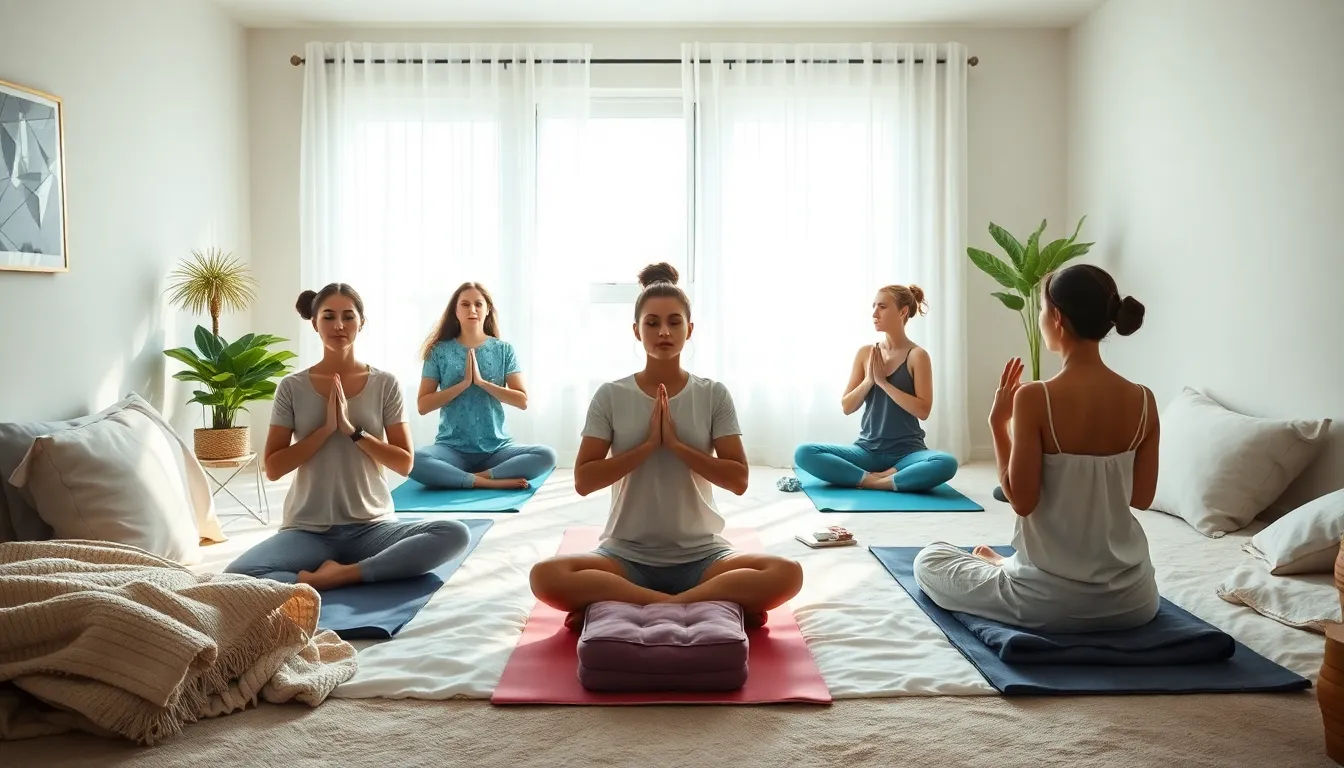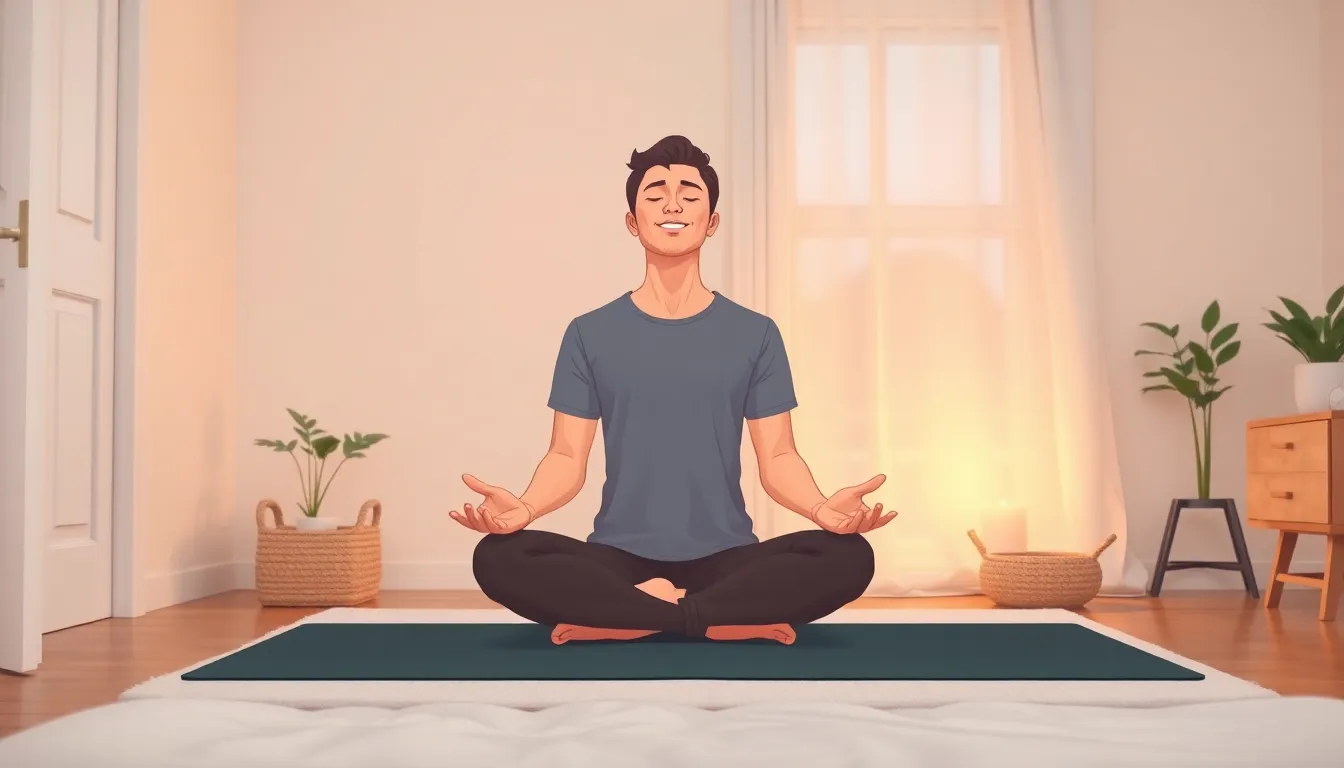As the day winds down and the moon takes center stage, it’s easy to fall into the trap of mindlessly scrolling through your phone or binge-watching yet another series. But what if those last moments before sleep could be transformed into something truly magical? The right bedtime routine can help you drift off into dreamland feeling refreshed and ready to conquer tomorrow.
Table of Contents
ToggleImportance of Bedtime Routines
Mindful bedtime routines enhance sleep quality. Engaging in intentional practices before sleep prepares the mind and body for rest. Activities like reading, meditating, or journaling promote relaxation, making it easier to fall asleep.
Structured routines signal the brain that it’s time to wind down. When individuals follow consistent patterns before bed, they often experience improved sleep efficiency. According to the National Sleep Foundation, a calming routine reduces sleep latency, allowing for quicker transition to sleep.
Creating a peaceful environment further enriches the bedtime experience. Dim lights, calming scents, and comfortable bedding contribute to an inviting atmosphere. This focus on the surroundings can significantly decrease distractions.
Regularity is key. Going to bed and waking up at the same time fosters a healthy circadian rhythm. Studies indicate consistent sleep patterns result in better cognitive function and mood regulation.
Avoiding stimulating activities before bed is crucial. Instead of screen time, individuals might choose to unwind with gentle stretches or a warm drink. This shift can lead to improved overall health, including better energy levels and focus throughout the day.
Prioritizing a bedtime routine serves not just immediate sleep benefits but long-term health impacts. A settled mind and a rested body enhance productivity and emotional resilience. Embracing these routines opens the door to a night of restorative sleep, balancing both physical and mental well-being.
Relaxation Techniques


Incorporating relaxation techniques into a bedtime routine significantly enhances preparation for restful sleep. These methods calm the mind and body, making it easier to transition into sleep.
Mindfulness Meditation
Mindfulness meditation focuses on the present moment, allowing thoughts and worries to fade away. Practicing this technique for even 5 to 10 minutes cultivates a serene environment. Participants often sit in a comfortable position, breathe deeply, and concentrate on their breath or a peaceful mantra. This practice promotes mental clarity and reduces anxiety. Research from the Journal of Clinical Psychology underscores its effectiveness in improving sleep quality. Regular engagement in mindfulness meditation can lead to quicker sleep onset and deeper sleep cycles.
Deep Breathing Exercises
Deep breathing exercises calm the nervous system, reducing tension and promoting relaxation. Inhale through the nose, counting to four, then exhale slowly through the mouth. Repeat this process for a few cycles, focusing on the breath’s rhythm. Individuals can feel the heart rate slow and their body relax. Implementing such exercises for 5 to 15 minutes before bed significantly improves sleep quality. A study published in the Journal of Sleep Research indicates that deep breathing lowers stress levels, facilitating a smoother transition to sleep. Regular practice establishes a calming pre-sleep routine that promotes restorative rest.
Preparing Your Bedroom
A well-prepared bedroom sets the stage for restful sleep. Prioritizing comfort and tranquility enhances the bedtime experience.
Decluttering Your Space
Clutter often distracts and creates stress in a bedroom environment. Organizing items reduces visual noise, fostering a serene atmosphere conducive to relaxation. Keeping surfaces free of unnecessary items promotes a sense of calm, allowing the mind to unwind. Consider using storage solutions like baskets or bins to maintain order. Arranging essential items within easy reach while minimizing visible clutter can create a peaceful oasis. A decluttered space correlates with improved mental clarity and, by extension, enhanced sleep quality.
Adjusting the Lighting
Soft lighting plays a crucial role in preparing for sleep. Dimming lights mimics the natural transition of evening, signaling the body to wind down. Incorporating lamps with warm, soft bulbs complements this process, creating a cozy ambiance. Utilizing blackout curtains blocks unwanted external light, ensuring an uninterrupted sleep environment. Engaging in light-reducing practices, such as using candles or fairy lights, can also be beneficial. Warm light encourages relaxation while protecting melatonin production, essential for restful sleep.
Limiting Screen Time
Minimizing screen time before bed significantly enhances sleep quality. Engaging with electronic devices stimulates the brain, making it difficult to relax and fall asleep.
Setting Boundaries with Devices
Establish specific time limits for device usage in the evening. Reducing usage to one hour before bedtime creates a buffer, allowing the mind to unwind. Use apps or built-in settings to monitor and restrict screen time effectively. Turn off notifications during the evening, as constant alerts contribute to distraction. Designate charging stations outside the bedroom; this habit removes devices from the sleeping environment.
Alternative Evening Activities
Consider engaging in calming activities that promote relaxation instead of screen time. Reading books can transport the mind to a different world and ease tension. Gentle stretches or yoga reduce muscle tension and enhance relaxation. Journaling provides an outlet for thoughts, allowing for mental clarity before sleep. Meditating before bed calms the nervous system and prepares the mind for deep rest. Enjoying herbal tea or practicing breathing exercises also cultivate a peaceful transition to sleep.
Nutritional Choices
Nutritional choices before bed significantly impact sleep quality. Selecting the right foods and managing hydration can foster serene slumber.
Foods That Promote Sleep
Foods containing tryptophan, like turkey and almonds, enhance serotonin production, aiding sleep. Complex carbohydrates from whole grains, such as brown rice and oats, help increase the availability of tryptophan in the brain. Incorporating tart cherries boosts melatonin levels naturally, leading to improved sleep cycles. Herbal teas like chamomile or valerian root also promote relaxation and prepare the mind for rest. Consider consuming a light snack, such as yogurt with honey, to avoid hunger without causing discomfort during the night. Prioritizing these foods in the evening routine supports a smoother transition to restful sleep.
Hydration Tips
Hydration before bed is crucial, but excessive fluid intake close to sleep can disrupt rest. Aim for hydration throughout the day, reducing drink quantity in the hour before bedtime. Drinking warm herbal tea offers both hydration and a soothing effect. Water-rich fruits like watermelon can hydrate without overloading the bladder. Avoiding caffeinated beverages ensures restful slumber, promoting relaxation. Moderation in fluid intake fosters optimal hydration while preventing nighttime awakenings for bathroom trips. Focus on these tips to achieve a balanced approach to hydration before sleep for better overall rest.
Establishing a mindful bedtime routine can significantly enhance sleep quality and overall well-being. By prioritizing intentional activities and creating a serene environment, individuals can prepare their minds and bodies for restorative rest. Incorporating relaxation techniques and making thoughtful nutritional choices further supports this process.
As they embrace these practices, they’ll likely notice improved energy levels and focus throughout the day. Transforming the moments before sleep into a purposeful ritual not only fosters better sleep but also cultivates a healthier lifestyle. With consistency and dedication, anyone can unlock the benefits of a truly restful night.


